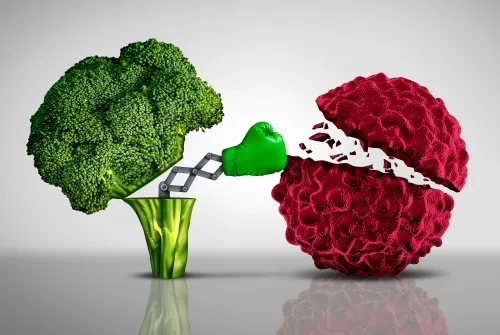Alo Yeditepe
Alo Yeditepe
Cancer and Nutrition
One-third of cancers are known to be caused by food. Smoking, exposure to high amounts of pesticides and artificial chemicals, excessive alcohol consumption, excessive consumption of fatty and fatty foods, insufficient fresh vegetable and fruit consumption, insufficient pulp intake, nitrite, and nitrate added foods, cooked meats very close to the fire, excessive consumption of salted, smoked and smoked foods are risk factors that increase the risk of cancer. Cancer frequency can be reduced by 30-40% with proper and healthy nutrition, physical activity, and weight control.
What are the general rules of nutrition in cancer?
It is of great importance to eat in a versatile and correct way for cancer nutrition.
Nutrition in terms of carbohydrates: 55-60% of the daily energy should be obtained from carbohydrates. Consumption of simple carbohydrates such as tea sugar, honey, and jam should be reduced; consumption of complex carbohydrates in foods such as whole grains and dried legumes should be increased.
Nutrition in terms of Protein: Approximately 12-15 percent of daily energy should be obtained from proteins and higher quality (animal) protein sources should be consumed.
Nutrition in terms of Fat: 25-30% of daily calories should be taken from fats. In order to ensure the use of fat-soluble vitamins (A, D, E, K) in the body, the ratio of energy from fat should not fall below 20%. Monounsaturated fats such as olive and fish oil are recommended to make up 10-15 percent of the fat in the diet. Fats such as sunflower, and corn extract are polyunsaturated fats, and the recommended amount is 7-8% of the fat in the diet. Foods such as meat, eggs, cheese, milk, butter, etc. are saturated fats and the recommended consumption is 10 percent of the total fat.
The Relationship Between Vitamins and Cancer
Vitamin A: It is an important antioxidant and protects DNA and cell membrane against oxidative destruction. Carotenoids are the precursors to vitamin A and are found in green and yellow fruits and vegetables. Carotenoids have strong antioxidant properties and thanks to these properties, they are effective in preventing cancers by reducing the effect of carcinogenic substances.
Vitamin C: They increase body resistance with immune system function. Vitamin C found in vegetables and fruits is found in high amounts in rose hips, parsley, sweat, arugula, green peppers, cauliflower, strawberries, tomatoes, and potatoes. They play a protective role against cancer by preventing the formation of carcinogenic nitrosamines.
Vitamin B: Important for the effectiveness of the immune system. When vitamin B is sufficient, it increases body resistance to cancer due to increased body resistance.
Vitamin E: It is a powerful antioxidant. It prevents the oxidation of fats, and cell oxidation and protects against cancer by preventing the formation of carcinogenic nitrosamines together with vitamin C. Vegetable oils are found in foods such as green leafy vegetables, nuts, and legumes.
Vitamin D: Although it is found in small amounts in the liver, egg yolks, milk, and dairy products, its best source is the sun. Daily needs cannot be fully met with nutrition. Adequate intake of vitamin D and calcium in the body reduces the risk of bone cancer.
Minerals and Cancer Relationship
Zinc: Sunflower seeds, aquaculture, meats, mushrooms, eggs, and legumes are among the foods rich in zinc. Zinc provides a protective effect against cancer by being an antioxidant and binding some carcinogens.
Copper: Meats, aquaculture, legumes, oilseeds, and molasses are the richest food sources in terms of copper. Adequate copper intake in the diet provides a protective effect against cancer as it reduces free radicals.
Selenium: It is most commonly found in aquaculture products and in grain products that have not decomposed bran. Adequate intake with diet provides a protective effect against carcinogens.
Iodine: The best source is iodized salt. It is rich in iodine, fish, and mushrooms. Iodine deficiency or excessive intake may increase the risk of developing cancer in the thyroid gland.
Iron: Meats, aquaculture, eggs, green leafy vegetables, dried legumes, sesame, molasses, and dried fruits are foods rich in iron. Iron reduces the effect of some chemical carcinogens.
Calcium: Milk, yogurt, cheese, ice cream, green leafy vegetables, and dry legumes are sources of calcium-rich foods. Adequate intake of calcium has a protective effect against bone and large bowel cancer.
Nickel: It can be taken by food, drink, and respiration. Excessive intake can cause cancer.
Lead: It is one of the most important carcinogens and can be taken into the body by switching to water and nutrients with environmental pollution such as car exhausts and factory wastes.
Cadmium: Although excess intake causes cancer formation, it can be taken into the body by mixing with polluted air and factory wastes, water, and nutrients.
Arsenic: Factory wastes are taken into the body by mixing with air, water, and nutrients. As well as causing sudden intoxications, continuous intake of small amounts increases the risk of skin and lung cancer
Phytochemicals and Cancer Relationship
Compounds that are biologically active of plant origin are called phytochemicals. It provides a protective effect against cancer by retaining oxidant radicals, activating detoxification enzymes, and stimulating the immune system.
Lycopene: Since people cannot synthesize carotenoids, they have to take them as food from the outside. Its most important source is tomatoes and lycopene is found in watermelon, pink grapefruit, rose hips, and papaya. Lycopene reduces the risk of cancer due to its protective effect against oxidative stress.
Polyphenols are found in almost all fruits and vegetables. They are powerful antioxidants, depending on their capacity to bind free radicals and their ability to reduce iron. Therefore, it has protective effects against cancer. They are divided into phenolic acids and flavonoids.
Phenolic Acids: Grapes, grapefruit, tomatoes, oranges, and apple juice are sources of phenolic acid, but they have a strong antioxidant effect against free radicals and other reactive oxygen species, which are the main cause of cancer. They have strong inhibitory activity against oxidation. In addition, phenolic acids have strengthening effects on immune systems.
Flavonoids: Flavonoids that cannot be synthesized in the human body are found in foods such as fruits, vegetables, tea, and cocoa. They act both as antioxidants and as free radical scavengers to protect against cancer.
Allicin Sulfites: They are found in onions and garlic. They have a protective effect against cancer by strengthening the immune system, increasing the excretion of carcinogens, and stimulating enzymes that suppress tumor cell proliferation.
Probiotics and Cancer Relationship
Probiotics play an important role in the inactivation and spread of carcinogens and especially in preventing the conversion of nitrosamines and bile sterols into carcinogenic substances. Moreover, probiotics prevent the development of cancer by strengthening the immune system. For people with weakened immune systems, probiotics can be dangerous, even if they are non-pathogenic microorganisms, and can lead to systemic infections.
What to Do to Avoid Cancer?
- It should form a healthy plate with a grain group, fruit and vegetable group, meat group, and milk and dairy products group.
- The pulp should be fed richly.
At least 5 servings of vegetables and fruits should be consumed per day.
Legumes should be consumed 2-3 times a week.
Whole-grain products should be consumed every day.
- Raffinic cereals and whole grains instead of pure sugar should be preferred.
- Cooking methods that require less fat should be tried.
- Foods with added nitrite and nitrate (such as salami, sausage, and sausage) should not be consumed.
- Inactivity should be avoided.
- Foods should be stored in the appropriate place and at the appropriate temperature.
- Foods should be stored in containers (such as unpainted glass containers) produced to store food.
- Foods should be stored at the appropriate temperature and time so that mold does not form.
- Alcohol and cigarettes should not be consumed.
You may not be able to change your genetic. However, you can change your eating habits, physical activity duration, and other environmental factors. By focusing on the factors, you can change and trying to change them, you can begin the change right away. I wish you healthy, happy, and peaceful days.
Clinical Psychologist Dietician Merve ÖZ
Yeditepe University Kosuyolu Hospital Department of
Nutrition and Dietetics
This content was prepared by Yeditepe University Hospitals Medical Editorial Board.
”
See Also
- What is Vitamin A? What are the benefits of Vitamin A?
- What is Selenium? What Does It Do? What are the Benefits?
- Does the Sweltering Heat Affect Our Mental Health?
- What is Vitamin E?
- How Should Patients Receiving Chemotherapy Eat?
- What is Chemotherapy? How is it Applied?
- What is Coenzyme Q₁₀? What are the Benefits of Coenzyme Q₁₀?
- What is Vitamin B12? What are the Symptoms of B12 Deficiency?
- What is Mythomania (Pathological Lying Disorder)? What Causes Mythomania?
- What is Emotional Hunger? How Does It Arise?
- Benefits of Spices
- What Does Narcissist Mean? Narcissistic Personality Disorder
- At What Age Should Children Start Using Social Media?
- What is the Ideal Age for Marriage?
- Is Cancer a Treatable Disease?
- Special Nutrition Recommendations for the Eid
- The True Face of the Protein Myth
- Nutrition in Cancer
- Cancer Treatment Methods
- What Are the Benefits of Beets?
- Suggestions to Get Rid of the Menopause Belly
- "Is the Watermelon Diet Healthy?
- Ways to Boost Mental Resilience
- Frequently Asked Questions about Detox
- Boost Your Immunity Naturally
- Which Foods Should be Consumed Together?
- Treatments that Reduce Life Loss in Cancer Give Hope!
- How Do You Approach a Child Who Is Reluctant to Go to School?
- Stop Blaming Yourself
- The Concern of Being a ‘’Good Mother’’ in Pregnancy
- It is Possible to Lose Weight by Dominating Your Brain
- Mom, Can I Sleep With You?
- 9 Points to Be Considered for a Healthy Ramadan Month!
- Emotional Eating May Be the Cause of Your Weight Gain
- The Healthiest Summer Fruits
- Shining Star of the Tables: Probiotics
- The Problem may be the Lack of Self-Confidence!
- Ways to Deal with Quarantine Weight
- Burnout Syndrome at Work Gains Weight
- Children Should Be Away From Fast Food Toy
- Do Individualized Treatments Offer Hope for Cancer?
- Children's Eating While Studying Prepares the Ground for Obesity
- Permeable Bowel Syndrome Can Prepare the Ground for Diseases
- Suggestions to Prevent Children from Gaining Weight While Still
- 8 Suggestions to Keep the Immune System Strong in Ramadan
- 8 Suggestions for Kids with Focus Problems
- It is also Possible to Lose Weight During the Holidays!
- Immune Enhancing Nutrients
- Is Co-Sleeping With the Child Right?
- The Hope of ‘Immunotherapy’ in Advanced-Stage Cancer Treatment
- Healthy New Year's Eve Table Suggestions
- Cancer Statistics Reveal the Importance of Protecting Against Cancer
- New Research Points to the Important Issues in Breast Cancer
- Found Out That She Had Cancer After Her Accident, and Immunotherapy Was Her Solution!
- Do not take unneeded calories to your body
- Life Support Booklet for Oncology Patients
- Suggestions to Increase Metabolic Rate…
- Nutrition Recommendations Before the Exam
- False Facts in Cancer
- How to Feed Children in Summer?
- Is There a Nutritional Difference Between Sports to Increase BMI and Sports to Lose Weight?
- What Should You Do to Avoid Gaining Weight for the Holidays? Do Not Be a Victim of the Buffet
- Nutrition and Diet
- Lung Cancer
- Most Common Cancers
- Healthy Diet
- Common Misconceptions About Cancer
- Elderly Care
- Alkaline Nutrition
- 9 Tips to Prevent You from Gaining Weight While at Home
- 9 Suggestions to Fix Childrens Deteriorated Eating Habits
- New Treatment Approaches Promising in Metastatic Breast Cancer
- Fibromyalgia May Be the Cause of Persistent Pain
- What to do from Iftar to Sahur for a Healthy Ramadan
Alo Yeditepe






